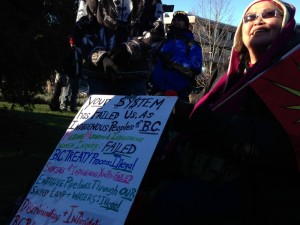Dal News, Misha Noble-Hearle, January 18, 2013 — Thirty years ago, Patricia Doyle-Bedwell sat in Dalhousie’s Student Union building with four other aboriginal students discussing issues such as class, racism and indigenous rights. She would never have guessed that 30 years later, more than 400 people would be packed into the Scotiabank Auditorium in support of, or simply eager to learn about, the same issues.
“I am overwhelmed with joy for the support of Idle No More,” says the Dalhousie professor and director of the Transition Year Program, speaking about the teach-in event held on campus last week.
Growth of a movement
Idle No More is a grassroots movement that began as an email exchange between four aboriginal activists in Saskatchewan last fall. Their discussions focused on Bill C-45, a 400-page bill passed in December 2012 by the Canadian government that made changes to the Indian Act, the Navigation Protection Act and the Environment Assessment Act, among others.
Worried how these changes would affect them and their treaty rights, the activists organized a rally in Saskatoon peacefully protesting the bill. Since then, the movement has caught fire, spreading rapidly and prominently around the country.
With live tweets during events and more than 75,000 “likes” on Facebook, Idle No More is powered by social media as well as the inaccuracies of mainstream media, says Howard Ramos, a faculty member in the Department of Sociology and Social Anthropology and an expert in Canadian Aboriginal mobilization and issues of ethnicity and race.
“The movement spread not just through social media, but when the media got it wrong,” says Dr. Ramos.
Often, Idle No More has been portrayed in affiliation with Attawapiskat Chief Theresa Spence’s hunger strike. After declaring that her First Nations band in Northern Ontario was in a state of emergency due to severe economic issues, she began a liquids-only diet on Dec. 11, 2012, demanding a meeting with Stephen Harper and Governor-General David Johnston. This media coverage sparked interest in Idle No More, merging the two separate movements, but Idle No More is about a lot more than one hunger strike.
The protection of Aboriginal Rights and environmental concerns are high on the to-do list of Idle No More organizers and supporters, but the movement also provides a platform for social learning and “unlearning,” an idea that Erin Wunker, English professor, explained at the January 8 event. She defined unlearning as the act of acknowledging something we thought was true as not being the truth.
“I am part of a population that has learned that I have always had a right to be here, and that is untrue,” said Wunker, identifying herself as a descendant of European-Canadian settlers. “We need to learn each other’s stories and unlearn the dominant discourse of them.”
Sparking a dialogue
Idle No More promotes education about issues that affect not only Aboriginal Canadians, but all Canadians, say those who are following it closely.
Read More: Dal News

 Follow
Follow



Net Zero Workers
There is a long history of wage freezes for workers that amount to wage cuts against rapidly rising costs of living. There was a time when governments were interested in supporting unions defending wages as a base for fair compensation for the work and a wage increase to maintain a decent standard of living against rising costs. In bad times, unions and employers could give and in depressions the unemployed ranks grow, families collapse, and businesses fold. Currently, governments are finessing to have it both ways. A psychology of governing parties is to assure consumers and investors that the economy is always looking up while convincing workers that the coffers are empty and the economy is recessing. While Athens burns business analysts comment daily that the markets are gaining lost ground. ‘Economic growth is on the horizon while we are pressed to freeze wages and put our fiscal house in order.’ Mixed messages for the consumer as worker, now the net zero worker.
“Net zero,” newspeak for wage freeze, was introduced as a mantra in about 2002 and repeated by the Public Sector Employers’ Council (PSEC) in British Columbia from 2008 to this current point. In 2010 the “net zero mandate” was reinforced in BC government or PSEC policy. Public sector workers were again net zero workers. The BCTF rallied hard against this and are standing up again to pool together all unions, as the governing party in BC again designated teachers as net zero workers. Let them bargain, let them mediate, Minister of Education George Abbott insisted in legislative debate on 12 March, as long as “all of that is within the context of net zero.”
Thirty years ago, top executive salaries were about 15 times that of the average worker’s. Now, those executive salaries are 75 times that of the worker’s. It’s increasingly difficult to accept one’s fate as a net zero worker in the face of skyrocketing executive salaries and lawless mismanagement. Of course, things might change should the net zero worker threaten to become a net zero consumer. Net zero spending was once called a boycott.
10 Comments
Posted in BC Education, Commentary, Employment rights, Government, Politics, Solidarity, Strikes & Labor Disputes, Unions, Working conditions
Tagged Economic Trends, Government, Working conditions